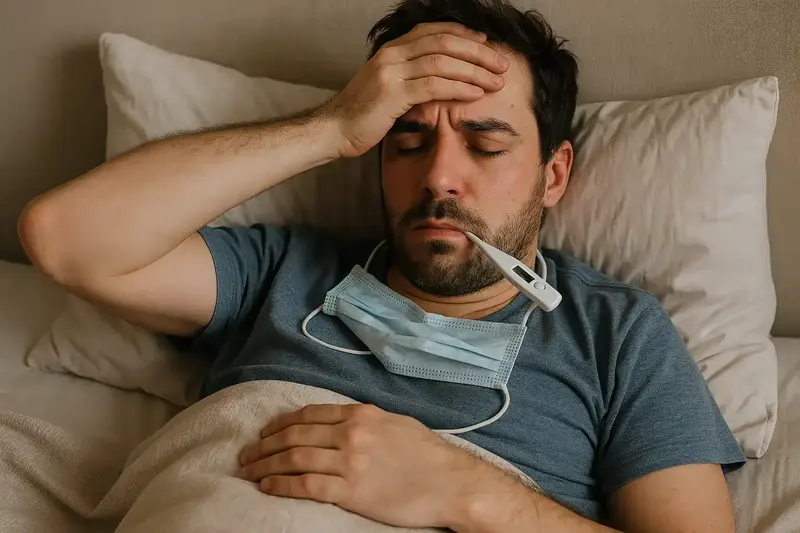- Published on: Dec 09, 2023
- 1 minute read
- By: Secondmedic Expert
Sexually Transmitted Disease (STD) Warning Signs: Recognizing Symptoms For Awareness
Sexually transmitted diseases (STDs) don't discriminate based on age, gender, or sexual orientation. Recognizing the warning signs and symptoms is the first step toward taking control of your sexual health. Understanding these signs is crucial for early detection, prompt treatment, and preventing further transmission. Let's dive deeper into the crucial signs of STDs that everyone should recognize to safeguard their well-being.
Understanding Common STD Symptoms
1. Unusual Discharge: Indicator of Infection
Abnormal discharge from the genitals, whether it's thick, cloudy, or foul-smelling, can signal an infection. Colors and consistency vary based on the type of infection.
2. Pain or Discomfort: Listen to Your Body
Pain or discomfort during urination or sexual activity, including burning sensations, itching, or soreness in the genital area, could indicate an STD.
3. Sores, Bumps, or Rashes: Visible Signs
Visible sores, bumps, warts, or redness around the genitals, anus, or mouth might indicate STDs like herpes, HPV, or syphilis. Prompt attention is crucial.
4. Flu-like Symptoms: Body's Reaction
STDs can trigger flu-like symptoms, such as fever, fatigue, swollen glands, or body aches. These signals should not be overlooked.
5. Irregular Bleeding: Pay Attention
Unusual bleeding between periods, after sex, or post-menopause for women could signal an STD like chlamydia or gonorrhea. Seek medical advice if observed.
The Significance of Early Recognition
Recognizing STD symptoms early is vital for prompt treatment and to prevent complications. Not all STDs exhibit immediate symptoms, making regular screenings imperative, especially after unprotected sex or changes in partners.
Taking Action: Seek Professional Assistance
If you notice any of these symptoms, don't delay seeking medical advice. Consulting healthcare professionals or visiting specialized clinics in sexual health ensures accurate diagnosis and tailored treatment plans.
Empowering Your Sexual Health
Understanding and identifying STD warning signs is pivotal. Early awareness leads to prompt diagnosis, timely treatment, and prevents further transmission. Prioritize safe sex practices and undergo regular screenings for overall well-being.
Key Steps Towards a Healthier Future
- Stay Informed: Knowledge is power; educate yourself about STDs and their symptoms.
- Practice Safe Sex: Use condoms consistently and limit sexual partners to minimize the risk of STD transmission.
- Undergo Regular Screenings: Don't wait for symptoms; get tested regularly, especially after unprotected sex or changes in partners.
- Seek Immediate Advice: If you suspect an STD, consult healthcare professionals promptly for guidance and support.
Conclusion: Advocate for Your Well-being
Take control of your sexual health today! Schedule a doctor consultation for a comprehensive STD screening. Prioritize your well-being and encourage loved ones to do the same. Knowledge and action are vital for a healthier future!
Remember, staying informed and proactive is key to ensuring a healthier future. Share your knowledge and spread awareness to promote a safer, healthier environment for all!
Read FAQs
A. Answer: The most common symptoms include unusual discharge from genitals, pain or discomfort during urination or sex, visible sores, bumps, or rashes in the genital area, flu-like symptoms such as fever or fatigue, and irregular bleeding.
A. No, not all STDs present immediate noticeable symptoms. Some infections can remain asymptomatic for a while, making regular screenings important, especially after unprotected sex or a change in partners.
A. While some symptoms might resemble normal issues, any persistent, unusual change or discomfort in the genital area should be examined by a healthcare professional. Getting tested helps in accurate diagnosis and treatment.
A. Yes, it's crucial not to delay seeking medical advice if you suspect an STD. Consulting healthcare professionals or visiting a specialized clinic ensures proper diagnosis and appropriate treatment.
A. Practicing safe sex by using condoms, limiting sexual partners, and having open discussions about sexual health with partners are effective preventive measures. Regular STD screenings, especially after unprotected sex or a change in partners, are also essential.









